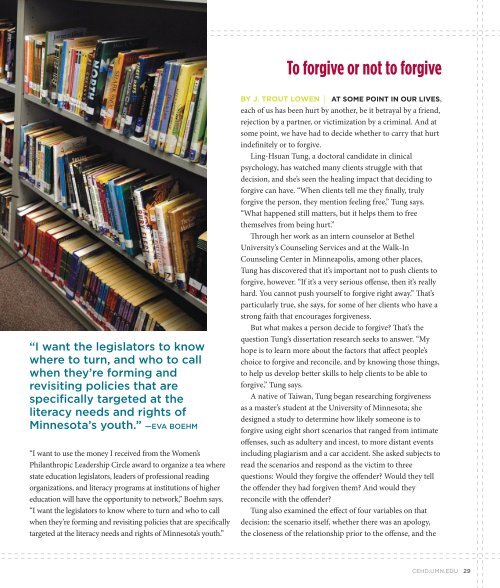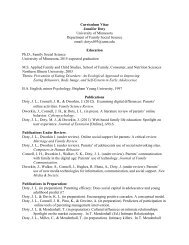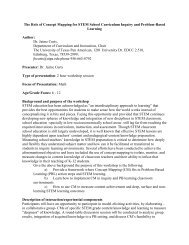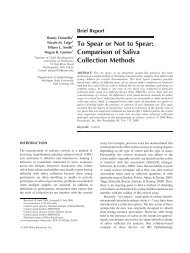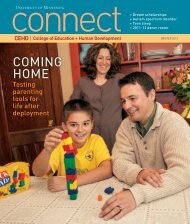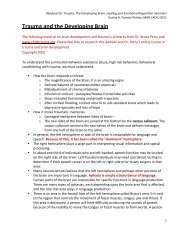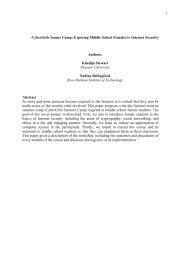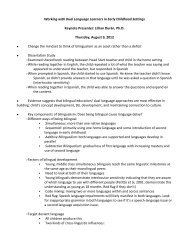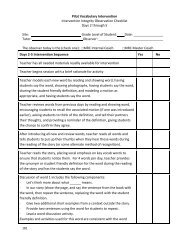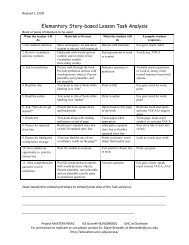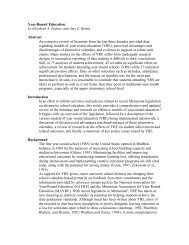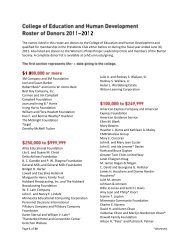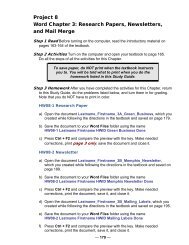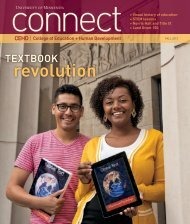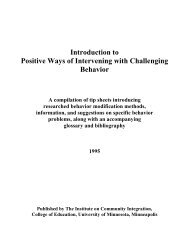connect! - College of Education & Human Development - University ...
connect! - College of Education & Human Development - University ...
connect! - College of Education & Human Development - University ...
Create successful ePaper yourself
Turn your PDF publications into a flip-book with our unique Google optimized e-Paper software.
“I want the legislators to know<br />
where to turn, and who to call<br />
when they’re forming and<br />
revisiting policies that are<br />
specifically targeted at the<br />
literacy needs and rights <strong>of</strong><br />
Minnesota’s youth.” —EVA BOEHM<br />
“I want to use the money I received from the Women’s<br />
Philanthropic Leadership Circle award to organize a tea where<br />
state education legislators, leaders <strong>of</strong> pr<strong>of</strong>essional reading<br />
organizations, and literacy programs at institutions <strong>of</strong> higher<br />
education will have the opportunity to network,” Boehm says.<br />
“I want the legislators to know where to turn and who to call<br />
when they’re forming and revisiting policies that are specifically<br />
targeted at the literacy needs and rights <strong>of</strong> Minnesota’s youth.”<br />
To forgive or not to forgive<br />
BY J. TROUT LOWEN | AT SOME POINT IN OUR LIVES,<br />
each <strong>of</strong> us has been hurt by another, be it betrayal by a friend,<br />
rejection by a partner, or victimization by a criminal. And at<br />
some point, we have had to decide whether to carry that hurt<br />
indefinitely or to forgive.<br />
Ling-Hsuan Tung, a doctoral candidate in clinical<br />
psychology, has watched many clients struggle with that<br />
decision, and she’s seen the healing impact that deciding to<br />
forgive can have. “When clients tell me they finally, truly<br />
forgive the person, they mention feeling free,” Tung says.<br />
“What happened still matters, but it helps them to free<br />
themselves from being hurt.”<br />
Through her work as an intern counselor at Bethel<br />
<strong>University</strong>’s Counseling Services and at the Walk-In<br />
Counseling Center in Minneapolis, among other places,<br />
Tung has discovered that it’s important not to push clients to<br />
forgive, however. “If it’s a very serious <strong>of</strong>fense, then it’s really<br />
hard. You cannot push yourself to forgive right away.” That’s<br />
particularly true, she says, for some <strong>of</strong> her clients who have a<br />
strong faith that encourages forgiveness.<br />
But what makes a person decide to forgive? That’s the<br />
question Tung’s dissertation research seeks to answer. “My<br />
hope is to learn more about the factors that affect people’s<br />
choice to forgive and reconcile, and by knowing those things,<br />
to help us develop better skills to help clients to be able to<br />
forgive,” Tung says.<br />
A native <strong>of</strong> Taiwan, Tung began researching forgiveness<br />
as a master’s student at the <strong>University</strong> <strong>of</strong> Minnesota; she<br />
designed a study to determine how likely someone is to<br />
forgive using eight short scenarios that ranged from intimate<br />
<strong>of</strong>fenses, such as adultery and incest, to more distant events<br />
including plagiarism and a car accident. She asked subjects to<br />
read the scenarios and respond as the victim to three<br />
questions: Would they forgive the <strong>of</strong>fender? Would they tell<br />
the <strong>of</strong>fender they had forgiven them? And would they<br />
reconcile with the <strong>of</strong>fender?<br />
Tung also examined the effect <strong>of</strong> four variables on that<br />
decision: the scenario itself, whether there was an apology,<br />
the closeness <strong>of</strong> the relationship prior to the <strong>of</strong>fense, and the<br />
CEHD.UMN.EDU 29


